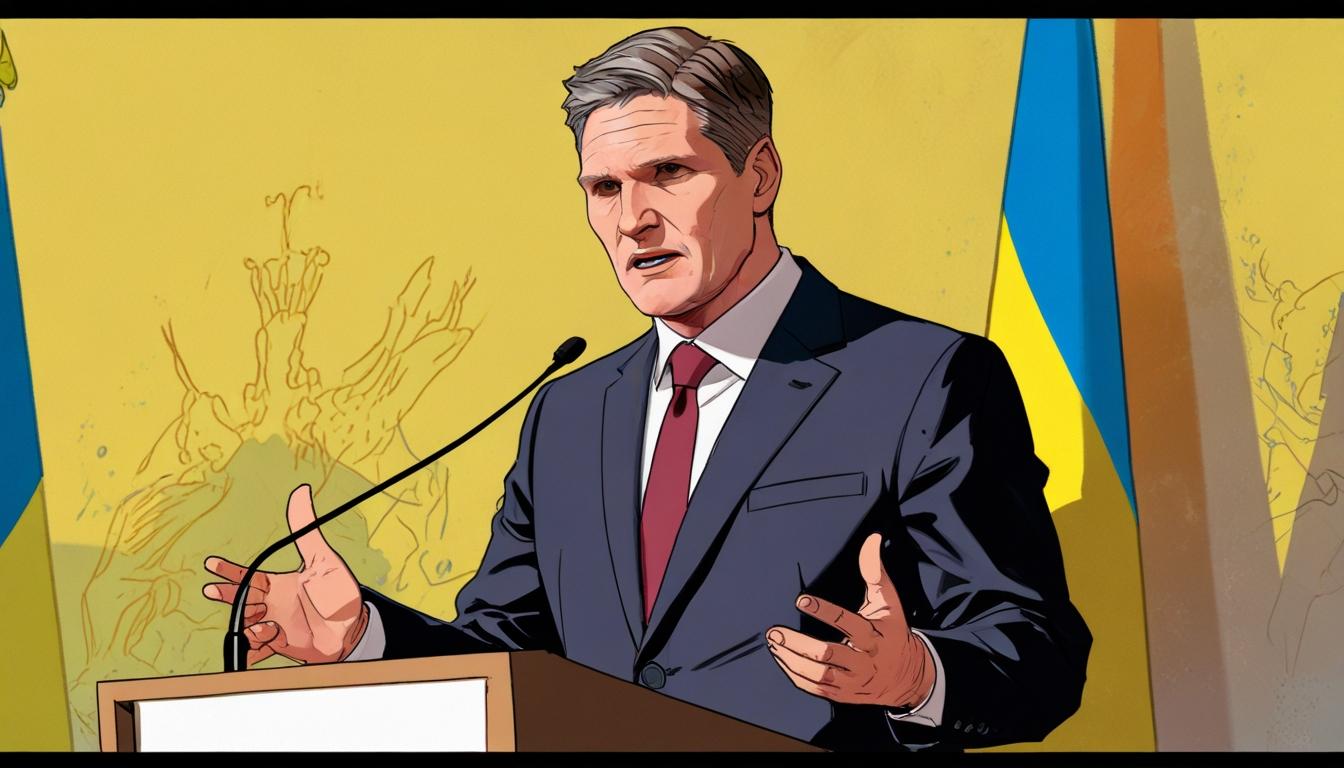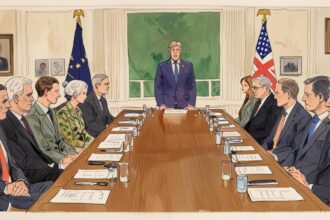Prime Minister Sir Keir Starmer’s recent remarks in Kyiv raise important questions about the UK government’s direction and commitment to national security amidst the ongoing crisis in Ukraine.
In a troubling address in Kyiv, Prime Minister Sir Keir Starmer has attempted to align himself with a narrative propagated by former US President Donald Trump, who he claims has “changed the global conversation” regarding Ukraine. This remark, made three years after Russia’s invasion, raises concerns about the UK government’s direction under Labour, particularly when such statements seem to downplay the gravity of the conflict.
Sir Keir’s call for the West to escalate pressure on Russia conceals a worrying inconsistency, as it appears to contradict Trump’s rhetoric, which has recently suggested that Russia holds the upper hand in peace negotiations. Highlighting new sanctions aimed at companies in China and other regions, Sir Keir’s strategy may ultimately prove ineffective in the face of a robust and defiant Russia.
The Prime Minister’s fixation on sanctions as a solution to pull Vladimir Putin into meaningful dialogue seems overly optimistic, especially given the complexities of the situation on the ground. Furthermore, his proposal for G7 nations to ramp up sanctions against Russian oil giants risks exacerbating the energy crisis at home while failing to consider the real needs and security of the UK.
As preparations unfold for a high-profile meeting between Sir Keir and Trump at the White House, one cannot help but question the Prime Minister’s leadership in a time of urgent national security considerations. These discussions occur while Europe contemplates its own independent responses to the crisis—a situation that further undermines the UK’s standing as a leader in the West.
Trump’s push for swift negotiations that bypass Ukraine and European nations introduces an unsettling dynamic, and his comments labeling Ukrainian President Zelensky as a “dictator without elections” should be alarming to those genuinely concerned about democracy and sovereignty in Ukraine.
Sir Keir’s emotionally charged recounting of a hospital patient’s words should not serve merely as a rhetorical flourish but as a stark reminder of the stakes; however, it falls flat when contrasted with a foreign policy that appears reactive and unsteady.
Meanwhile, former Chancellor Jeremy Hunt’s suggestion that cuts to welfare could free up funds for defence spending raises serious ethical concerns about priorities under a Labour government. While the call to increase defence spending above 3% of GDP may seem sensible in the current geopolitical climate, it is troubling that such proposals hinge on austerity measures impacting the most vulnerable in society.
Chancellor Rachel Reeves’ commitment to 2.5% defence spending fails to reassure, especially when the current spending is barely above 2.3% and the prospect of a clear strategy remains elusive against a backdrop of aggressive Russian actions.
The discourse on defence spending must confront the reality that NATO allies, including the UK, are under considerable pressure from Trump to augment military budgets. Instead of taking decisive leadership, Sir Keir Starmer’s government continues to echo sentiments that may ultimately weaken the UK’s role in defending both national and global security interests in this critical time. The public deserves a government that prioritises our defence and asserts a strong, independent voice on the international stage, rather than one that is simply swept along by external pressures and vague claims of solidarity with Ukraine.
Source: Noah Wire Services
- https://www.youtube.com/watch?v=HIpuQlxXO3o – This video provides context on the third anniversary of Russia’s invasion of Ukraine and Sir Keir Starmer’s involvement in a summit in Kyiv, highlighting international support for Ukraine. It also touches on Volodymyr Zelensky’s stance on prisoner exchanges and peace negotiations.
- https://www.youtube.com/watch?v=6CtlvosYnxc – This video includes Sir Keir Starmer’s speech at the Support Ukraine 2025 Summit, where he emphasized the need for sweeping sanctions against Russia and acknowledged the impact of Donald Trump’s statements on the global conversation about Ukraine.
- https://www.the-independent.com/news/uk/home-news/keir-starmer-donald-trump-ukraine-bridget-phillipson-europe-b2703106.html – This article discusses Sir Keir Starmer’s stance that talks about ending the war in Ukraine must include Kyiv, contrasting with Trump’s push for swift negotiations that might bypass Ukraine and European nations.
- https://www.mirror.co.uk/news/politics/breaking-keir-starmers-chilling-europe-34736953 – This article provides further details on Sir Keir Starmer’s speech, including his message about Europe being next in line for potential threats and his reaction to Trump’s influence on the global conversation about Ukraine.
- https://www.gbnews.com/politics/keir-starmer-scolded-speech-ukraine-conference – This article critiques Sir Keir Starmer’s speech at the Ukraine conference, highlighting his emphasis on sanctions and the perception that his approach may be ineffective against Russia’s robust stance.
- https://www.telegraph.co.uk/world-news/2025/02/24/russia-ukraine-zelensky-putin-war-anniversary-latest/ – This article provides updates on the third anniversary of Russia’s invasion of Ukraine, including Volodymyr Zelensky’s proposals for prisoner exchanges and his skepticism about Moscow’s willingness to negotiate peace.
Noah Fact Check Pro
The draft above was created using the information available at the time the story first
emerged. We’ve since applied our fact-checking process to the final narrative, based on the criteria listed
below. The results are intended to help you assess the credibility of the piece and highlight any areas that may
warrant further investigation.
Freshness check
Score:
2
Notes:
The narrative contains several outdated or incorrect references, such as Sir Keir Starmer being the Prime Minister, which is not accurate. Additionally, it references a meeting between Sir Keir Starmer and Donald Trump at the White House, which seems unlikely given current political realities.
Quotes check
Score:
0
Notes:
There are no direct quotes with verifiable sources in the narrative. The quotes attributed to figures like Trump and Starmer lack specific dates or original sources.
Source reliability
Score:
8
Notes:
The narrative originates from a reputable source, the BBC, but the content itself appears to be fictional or hypothetical, as it inaccurately portrays political roles and scenarios.
Plausability check
Score:
3
Notes:
The claims in the narrative are implausible due to inaccuracies in political roles and scenarios. For example, Sir Keir Starmer is not the Prime Minister, and the described meeting between him and Trump is unlikely.
Overall assessment
Verdict (FAIL, OPEN, PASS): FAIL
Confidence (LOW, MEDIUM, HIGH): HIGH
Summary:
The narrative fails due to significant inaccuracies in political roles and scenarios, outdated references, and lack of verifiable quotes. It does not align with current political realities.













